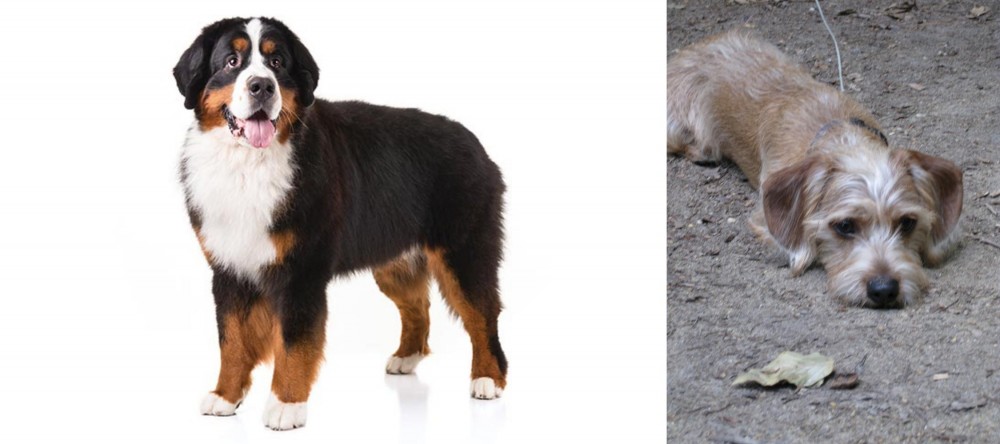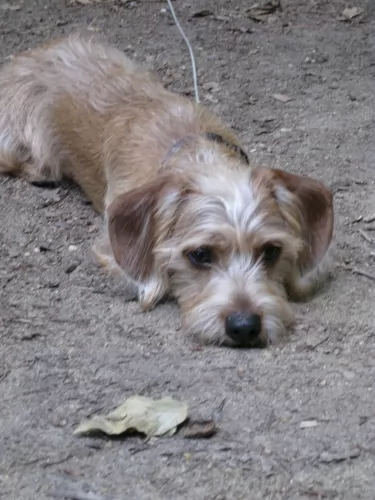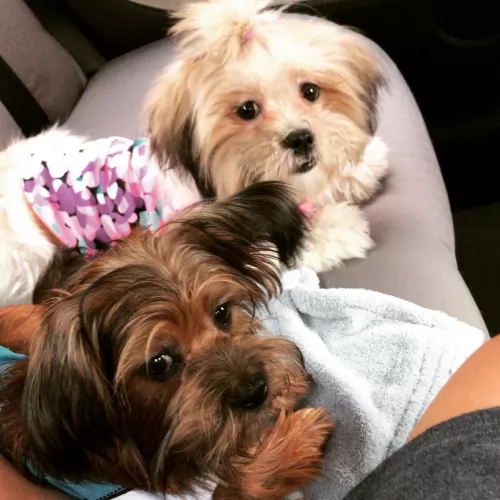 Petzlover
Petzlover Bernese Mountain Dog is originated from Switzerland but Schweenie is originated from United Kingdom. Bernese Mountain Dog may grow 21 cm / 9 inches higher than Schweenie. Bernese Mountain Dog may weigh 46 kg / 102 pounds more than Schweenie. Bernese Mountain Dog may live 7 years less than Schweenie. Bernese Mountain Dog may have more litter size than Schweenie. Bernese Mountain Dog requires Moderate Maintenance. But Schweenie requires Low Maintenance
Bernese Mountain Dog is originated from Switzerland but Schweenie is originated from United Kingdom. Bernese Mountain Dog may grow 21 cm / 9 inches higher than Schweenie. Bernese Mountain Dog may weigh 46 kg / 102 pounds more than Schweenie. Bernese Mountain Dog may live 7 years less than Schweenie. Bernese Mountain Dog may have more litter size than Schweenie. Bernese Mountain Dog requires Moderate Maintenance. But Schweenie requires Low Maintenance
 The Bernese Mountain Dog comes from the Swiss Alps and is one of four separate breeds called Sennenhund or “Alpine pasture dog”. The Name Bernese Mountain Dog indicates the area of Switzerland that the dogs come from – the canton of Bern. These groups of dogs accompanied the dairymen and herders and they were farm dogs. They pulled carts, delivered goods from village to village. The Bernese Mountain Dog was part of this group along with: Greater Swiss Mountain Dog, Appenzeller,Entlebucher Mountain Dog and the Bernese Mountain Dog. It is probably true that the Bernese Mountain Dog has been a part of farm life in the Alps for over 2000 years.
The Bernese Mountain Dog comes from the Swiss Alps and is one of four separate breeds called Sennenhund or “Alpine pasture dog”. The Name Bernese Mountain Dog indicates the area of Switzerland that the dogs come from – the canton of Bern. These groups of dogs accompanied the dairymen and herders and they were farm dogs. They pulled carts, delivered goods from village to village. The Bernese Mountain Dog was part of this group along with: Greater Swiss Mountain Dog, Appenzeller,Entlebucher Mountain Dog and the Bernese Mountain Dog. It is probably true that the Bernese Mountain Dog has been a part of farm life in the Alps for over 2000 years.
In some regions of the Alps, these dogs were called Durrbachhund after a small town named Durrbah and are said to be rooted in the Molosser breeds. Tin 1902 the Swiss Kennel Club recognized the Bernese Mountain Dog as a separate breed and the first breed club was founded in 1907 in the region of Burgdorf. The first standard for the breed was written and separated the 4 dogs into their own breeds. The Molosser is an ancient breed whose versatility and travels made it expressly influential in the developing of Mastiff dogs like St. Bernards, Great Pyranees, Mastiffs and Swiss Mountain Dogs like the Bernese.
However at the end of the 19th century famers and shepherds began to import other breeds of working dogs, while at the same time automated modes of transportation began to replace the farm dogs. Under these circumstances the number of Bernese Mountain Dog began to decline and the breed faced potential extinction. A group of people were gathered together to save the Berner, including Franz Schertenleib and Albert Heim. Still today the Bernese are in short supply and because of the need and desire to increase the numbers, some breeding practices have not been as good as they should have been. However, today’s Berner is a great family dog and he still loves to work. He is good at carting, herding, search and rescue, watch dog, tracking, and competitive obedience.
The Bernese Mountain Dog came to the US after World War I and was imported to Britain in the 1930’s. The AKC accepted the Berner as a new Working-Class breed in 1937. It was not until 1968 that the Bernese Mountain Dog Club of America was formed. In 1981, the AKC accepted the club as a member and in 1990 they (AKC) adopted the standard used today to judge the Bernese Mountain Dog.
 The Schweenie is a hybrid dog, with the parent breeds being the Shih Tzu and the Dachshund.
The Schweenie is a hybrid dog, with the parent breeds being the Shih Tzu and the Dachshund.
The Schweenie dog has been around for about 4 decades when breeders were looking for a dog that would be free of the health issues of the purebred parent breeds.
Because the Schweenie is a mix breed, it doesn’t qualify to be part of the American Kennel Club. He is however recognized by the Designer Breed Registry and some other clubs.
 The Bernese Mountain Dog is a large, lovable clown. He has a heavy build with a tri color- mostly black – coat. He should have a white chest and rust coloring on the front of his legs, the sides of his mouth, and above his eyes. His eyes should be dark and blue eyes are a disqualification. His coat is silky, thick and long. He has medium sized triangle shaped ears and a scissors bite. He has round toes and strong, straight legs, He is well suited to cold weather. His skull is broad and flat, his muzzle is straight and strong, his nose must be black, and he does not usually drool.
The Bernese Mountain Dog is a large, lovable clown. He has a heavy build with a tri color- mostly black – coat. He should have a white chest and rust coloring on the front of his legs, the sides of his mouth, and above his eyes. His eyes should be dark and blue eyes are a disqualification. His coat is silky, thick and long. He has medium sized triangle shaped ears and a scissors bite. He has round toes and strong, straight legs, He is well suited to cold weather. His skull is broad and flat, his muzzle is straight and strong, his nose must be black, and he does not usually drool.
He is an imposing sight, but he is also as non-aggressive as any breed. He is strong, intelligent, and agile. He should have his dew claws removed. This breed should be self-assured, yet good natured and calm. He is welcoming to strangers and loyal to his people. He needs his people.
 The Schweenie will be a smallish dog standing at roughly 27cm to 50cm and weighing 4 – 9kg.
The Schweenie will be a smallish dog standing at roughly 27cm to 50cm and weighing 4 – 9kg.
Because of the Dachshund parent, he will likely have a long body. The coat is shortish to medium length and can be a variety of colors – from a rusty color to brown, black, grey and even a cream shade. The ears are floppy and the tail medium length.
He is a small dog who is smart and bright and who wants to please his human owners. He loves people and wants to be around them and involved in their activities.
Small and cute though he is, he can be a stubborn dog and become a little big aggressive too if he is feeling a bit moody. He will need to be trained and socialized if you want him to obey your simple commands such as sit, stay, lie down and come.
He is intelligent enough to learn these simple commands with ease.He is both alert and vigilant, and this makes them good watchdogs.
 When reading the AKC standard for the Bernese Mountain Dog you will find that the breed is good natured and self-assured. They are not aggressive, shy or anxious. These are gentle, loving dogs. At the same time, they should be socialized to all kinds of animals, people and children when they are puppies. They are happy outside but need to live in the house with their people. They need exercise and play, and because they are so large, they need this outside. But when it comes to cuddling and sleeping they need to be indoors.
When reading the AKC standard for the Bernese Mountain Dog you will find that the breed is good natured and self-assured. They are not aggressive, shy or anxious. These are gentle, loving dogs. At the same time, they should be socialized to all kinds of animals, people and children when they are puppies. They are happy outside but need to live in the house with their people. They need exercise and play, and because they are so large, they need this outside. But when it comes to cuddling and sleeping they need to be indoors.
They love children though you should be careful with small children because of the Berner’s size and their not being aware of their size at times. They are extremely loyal to their people and want to be with people. They are intelligent, and they want to please their people. At the same time, they are sensitive. They do not respond well to punishment or harshness. They are imposing but they are lovers at heart.
 The Schweenie can be somewhat reserved and they need exercise regularly as well. If they don’t get enough exercise, they tend to become jittery and this can make them become a bit snappy. The are more prone to be snappy and aggressive with children who haven’t been taught how to treat animals gently and with respect.
The Schweenie can be somewhat reserved and they need exercise regularly as well. If they don’t get enough exercise, they tend to become jittery and this can make them become a bit snappy. The are more prone to be snappy and aggressive with children who haven’t been taught how to treat animals gently and with respect.
They’re small enough to adjust to life in the city or countryside but will still need to be exercised.
The little Schweenie, with the right kind of owner can become a great little pet and companion.
 Even though it is well known that cancer is the leading cause of dog deaths across the globe, the Bernese Mountain Dog is particularly prone to die of cancer. Half of all Berners compared with 27% of all dogs, die from cancer. The Berner’s life span is also shorter than most dogs his size. IT is also not just one cancer that attacks the Bernese Mountain Dog but rather at least 6 or more including mast cell, osteosarcoma, malignant histiocytosis, fibrosarcoma, and lymphosarcoma.
They can also suffer from PRA (Progressive Retinal Atrophy), hypoadrenocorticism, cataracts and histiocytic sarcoma. Another issue that plaques the Berner more than other breeds is musculoskeletal issues that cause mortality. This can include issues such as cruciate ligament rupture, arthritis and hip dysplasia. These types of aliments cause death in 6% of the breed while they are usually the cause of mortality in only 2% of all other dogs.
Even though it is well known that cancer is the leading cause of dog deaths across the globe, the Bernese Mountain Dog is particularly prone to die of cancer. Half of all Berners compared with 27% of all dogs, die from cancer. The Berner’s life span is also shorter than most dogs his size. IT is also not just one cancer that attacks the Bernese Mountain Dog but rather at least 6 or more including mast cell, osteosarcoma, malignant histiocytosis, fibrosarcoma, and lymphosarcoma.
They can also suffer from PRA (Progressive Retinal Atrophy), hypoadrenocorticism, cataracts and histiocytic sarcoma. Another issue that plaques the Berner more than other breeds is musculoskeletal issues that cause mortality. This can include issues such as cruciate ligament rupture, arthritis and hip dysplasia. These types of aliments cause death in 6% of the breed while they are usually the cause of mortality in only 2% of all other dogs.
 With good care, your Schweenie can live to be 12 to 15 years of age. Every dog, no matter how healthy, can get some of the health problems that plague many dogs.
With good care, your Schweenie can live to be 12 to 15 years of age. Every dog, no matter how healthy, can get some of the health problems that plague many dogs.
This is where the cushions between each vertebra come into contact with the spinal cord. It can result in nerve damage and sometimes even paralysis. Because the Shih Tzu is one of the parent breeds, you will need to be aware of this ailment as these dogs are more susceptible to this disease.
Hypoglycemia is fairly common in small dogs and it is where there is a drop in blood sugar. It can be brought on by stress. It can also be referred to as low blood sugar and it can be deadly. If your pet is hypoglycemic, you will notice a loss in appetite, extreme lethargy, trembling and unusual behavior. You will need to get your Schweenie to the vet immediately for tests and treatment.
 As with any large purebred dog, the Bernese Mountain Dog needs high quality food that will provide hi with nutrition and keep him from becoming overweight if fed properly. He is however a very large dog with a very large appetite. Watch his calorie intake. It’s ok to use treats if you fit them into the overall calorie intake for the day. Feed him smaller meals twice a day.
As with any large purebred dog, the Bernese Mountain Dog needs high quality food that will provide hi with nutrition and keep him from becoming overweight if fed properly. He is however a very large dog with a very large appetite. Watch his calorie intake. It’s ok to use treats if you fit them into the overall calorie intake for the day. Feed him smaller meals twice a day.
As previously mentioned the breed has quite a few health challenges to deal with, cancer being the number one issue. The small genetic line is one of, if not the main, culprit in this high mortality rate and short life span of the Bernese Mountain Dog. In addition to the conditions mentioned above, they are also susceptible to bloat (stomach inversion). In addition, they face the conditions mentioned previously and should be tested for dysplasia of the hip and elbow, Von Willebrand’s Disease, Cardiac testing and an eye or ophthalmologist exam.
The Bernese Mountain Dog is a gentle giant. They have a calm happy demeanor and they love to work. In fact, they need to work. They love children and will quickly give them cart rides. They compete in carting competitions and herding events sponsored by the AKC. They need exercise but not an extreme amount or intense type. A half-hour a day is enough for them. They love long walks or hiking. They are great companions for backpacking or camping. They are also good at tracking, rally, obedience, and agility.
 Your Schweenie will need to be brushed at least twice a week to rid him of loose hairs. Because of his floppy ears, you will need to clean them and check for redness. If you don’t like the idea of probing inside the ear, professional groomers or the vet will do it for you.
Your Schweenie will need to be brushed at least twice a week to rid him of loose hairs. Because of his floppy ears, you will need to clean them and check for redness. If you don’t like the idea of probing inside the ear, professional groomers or the vet will do it for you.
Trim his nails if they don’t wear down on their own.
Provide him with a nice dry, warm spot to sleep.
Provide him with nice chewy toys that will keep him occupied.
Exercise him every day. Taking him on walks and playing ball games with him will keep him fit and trim but also help with staving off boredom.
Ensure his vaccines against deadly diseases are up to date. See that he gets to the vet when he appears to be under the weather.
He is a small dog so you have to be careful about how you feed him. You need to feed him a nutrient-rich dry kibble. Read the packaging and buy dog food according to his size, age and activity levels.
Try and include some home-made food into your dogs diet. A little bit of boiled chicken, brown rice or pasta, sweet potatoes, carrots and spinach all chopped up will do him good and can be added into the dry kibble twice a week. Some raw meat should also occasionally be added in as this can help to prevent some skin problems. Be sure that cool, fresh water is available for your pet at all times.